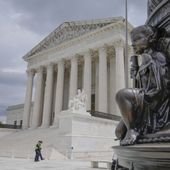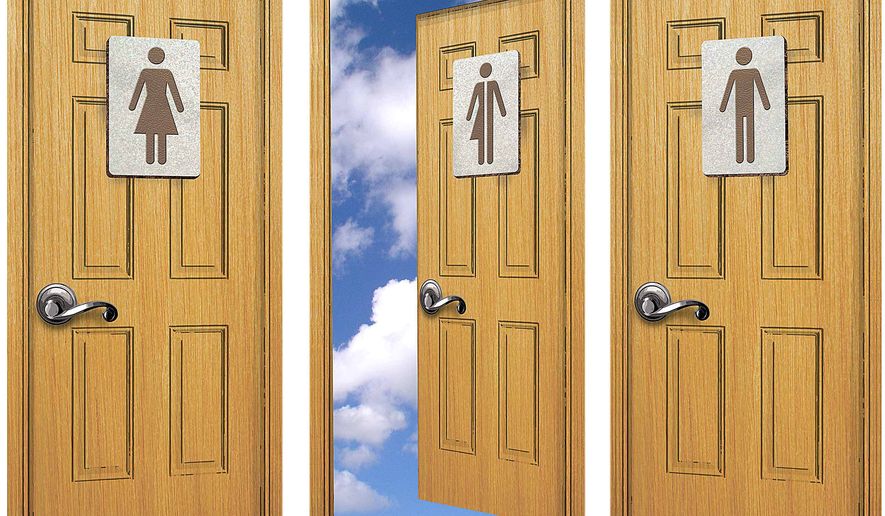A legislative battle over transgender restroom access is brewing in Washington after a state commission enacted rules requiring that bathroom, shower and locker room use in public accommodations be based on “gender identity,” not sex.
State legislators are already working to draft bills in reaction to the Washington State Human Rights Commission’s newly enacted rules, saying the panel overstepped its authority by leaving the Legislature out of such a major change in policy and understanding.
“For the Human Rights Commission to unilaterally make a [Washington Administrative Code] change — they’re not an elected body,” said Republican state Rep. Graham Hunt. “They’re making decisions that widely affect the public although they’re not elected and held accountable to the public in the same fashion.”
The commission took action after an eight-month dispute over transgender access at the YMCA of Pierce and Kitsap counties, which at first allowed and then prohibited opposite-sex use of bathrooms, showers and locker rooms.
In a Dec. 15 statement, YMCA President and CEO Bob Ecklund said the organization planned to be in compliance with revisions to the Washington Administrative Code effective Dec. 26.
“As this relates to our restrooms and locker room procedures, we will not discriminate based on gender identity effective December 21,” Mr. Ecklund said. “This timing will allow for staff education and training.”
Commissioner Charlene Strong said the panel’s rulemaking only “enhances” the state Legislature’s work “and in no way harms that work.”
Emily Chiang, legal director of the American Civil Liberties Union of Washington, described the action as a clarification of the 2006 Washington Law Against Discrimination, not a wholesale change.
“What they’ve done is basically clarify existing Washington state law, which already prohibits discrimination on the basis of sexual orientation or gender identity,” Ms. Chiang said in an email. “So, it wouldn’t really make sense for the Legislature to be involved, the HRC action is designed to give additional guidance to people looking to understand the state law.”
She called the move a “fabulous thing. The ACLU has long supported the rights of transgender people.”
In its proposed rule issued in May, the commission said that “[r]ules are needed in order to interpret that law to provide understanding to businesses, employers, and the public.”
“Stakeholders have requested clarification and explanation of the law in the form of rules. A chapter is added for sexual orientation and gender identity issues, and additional sections are amended to add sexual orientation as a protected class,” said the May 20 notice.
Although 17 states prohibit discrimination on the basis of gender identity, such laws have not specifically required access to public accommodations such as restrooms by biological men who identify as women.
Until now, California’s Assembly Bill 1266, which requires public schools to allow access to restrooms, showers and sports teams to boys who identify as girls, and vice versa, has been regarded as the most sweeping transgender law in the nation.
In Washington, the commission’s revision is meeting resistance.
“This first-of-its-kind, statewide law is part of the recent push to frame gender-segregated bathrooms as an affront to ‘equality,’” said Joseph Backholm, executive director of the Family Policy Institute in Washington. “So far, the public hasn’t been buying it.”
He cited the November vote in Houston in which voters overwhelmingly defeated an equal rights ordinance that would have imposed penalties for businesses that tried to stop biological males who identify as females from using women’s restrooms.
Mr. Hunt said several bills have been proposed in anticipation of the state legislative session, which begins Jan. 17. He said his draft would require “pre-operative or non-operative” transgender people to use facilities that correspond with their biological sex.
He said the commission’s rule poses a threat to public safety by making it virtually impossible to stop sexual predators from taking advantage of the law to gain access to women’s restrooms and other facilities.
“My concern is the safety side,” Mr. Hunt said. “There are folks who have come forward and reached out to me that have been taken advantage of, put into abusive situations because of somebody who’s been allowed access to private, intimate settings like locker rooms and bathrooms.”
He said he has also heard from transgender people who are comfortable using private changing facilities and gender-neutral restrooms but worried about the spotlight.
“Some members of the transgender community have reached out and said, ‘This is what we prefer to use,’” Mr. Hunt said. “They don’t want to be put into an uncomfortable situation either. And in fact some of them have mentioned that they’re actually pretty darned upset that this has become such a highlighted issue, because it’s drawing attention to them whereas they otherwise didn’t want the attention.”
Washington Gov. Jay Inslee, a Democrat, came out in support last week of the YMCA’s decision to allow transgender access, telling the Kitsap Sun, “We cannot keep perpetuating the stereotype that transgender people pose a threat to our communities.”
Mr. Hunt said he hoped the issue would not devolve into a partisan fight. Republicans control the state Senate while Democrats hold the state House.
“I don’t really see privacy as a partisan issue,” Mr. Hunt said.
• Valerie Richardson can be reached at vrichardson@washingtontimes.com.




Please read our comment policy before commenting.